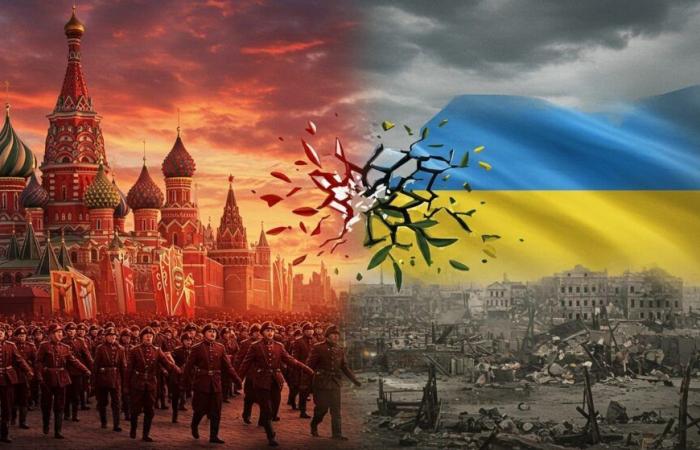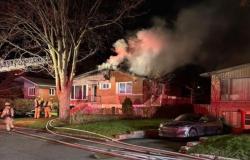Russia accuses Zelensky of threatening the celebrations of May 9. What risks are hovering on this historic event? The answer could surprise …
Each year, May 9 marks a solemn moment in Russia: the celebration of victory against Nazi Germany, an event steeped in history and national pride. But in 2025, this date surrounded by a palpable tension. While leaders around the world are preparing to join Moscow for the 80th anniversary of this anniversary, a statement by the Ukrainian president has thrown oil on fire, causing a scathing response from Russia. What happened, and why does this event risk becoming a major geopolitical friction?
May 9 under high voltage
May 9 is not a simple date in the Russian calendar. It is a symbol, a moment when the country honors its veterans and celebrates the resilience of its people in the face of adversity. This year, the festivities planned in Moscow were to bring together around twenty heads of state, including influential figures such as the Chinese president or the Brazilian leader. But an unexpected comment has turned the atmosphere upset.
The Ukrainian president, in a recent statement, expressed doubts about the security of foreign leaders present in Moscow. He suggested that incidents could arise, accusing Russia of being able to orchestrate provocations and then reject fault on Ukraine. These words, perceived as a warning, immediately aroused the ire of Moscow.
“A direct threat to the security of veterans and celebrations. -spokesperson for the Russian Ministry of Foreign Affairs
A statement that makes waves
Why such a release from the Ukrainian president? To understand, you have to plunge back into the context of the conflict between Russia. For years, the two nations have accused each other of provocations, and each international event becomes an opportunity to score points on the diplomatic scene. This time, the declaration seems to aim to sow doubt about Moscow’s ability to guarantee a secure environment for its guests.
In response, Russia has not mince its words. An official representative described the words of “direct threat”, accusing Ukraine of wanting to disturb a sacred moment for the Russian people. This verbal escalation is not trivial: it reflects persistent tensions and mutual distrust that dominate relations between the two countries.
May 9: more than a celebration
To grasp the importance of this event, we must look at what represents on May 9 in Russia. Unlike Western Europe, where victory against Nazism is celebrated on May 8, Russia commemorates this event a day later, due to the jet lag during the German capitulation in 1945. This day is marked by grandiose parades, tributes to veterans and national mobilization around the history of the country.
This year, the 80th anniversary makes the event even more symbolic. The presence of foreign leaders, from allied or neutral countries, was to strengthen the image of Russia on the international scene. But the Ukrainian statements are likely to throw a shadow on this diplomatic force demonstration.
- Military parades : Impressive parades on the Red Square.
- Tributes to veterans : Ceremonies across the country.
- Diplomacy : Meetings between world leaders.
A dotted ceasefire
At the heart of this controversy, a proposal for a temporary ceasefire has also been talked about. Russia suggested a break in hostilities from May 8 to 10, an initiative presented as a gesture of good will to allow peaceful celebrations. But Ukraine rejected this idea, arguing for a total and unconditional stop of the fighting.
-This refusal is explained by a deep distrust. Ukraine fears that short truces only serve Russia to recover its breath before relaunching its offensives. A recent precedent, during the Easter weekend, seems to consolidate this position: after a break accepted by the two parties, hostilities resumed more beautiful the next day.
“We are not playing with partial truces. Only a lasting peace counts. ” – Ukrainian president
Diplomatic issues
The controversy around May 9 goes beyond the Russian-Ukrainian bilateral framework. It highlights the challenges facing the invited countries in Moscow. On the one hand, their presence could be interpreted as an implicit support for Russia in a context of war. On the other, their absence would risk offending a strategic partner, even complicating economic or political relations.
For country leaders like China, Brazil or Kazakhstan, the decision to participate or not in the celebrations is a balancingist exercise. They must weigh the implications of their choice while sailing in an international climate marked by polarization.
| Pays | Position |
|---|---|
| Chine | Strategic ally of Russia |
| Brazil | Neutral position, member of the BRICS |
| Kazakhstan | Historical Partner |
A conflict on global repercussions
The dispute around May 9 is only one episode among others in the Russian-Ukrainian conflict, but it illustrates the overall ramifications of this war. Each declaration, each diplomatic gesture is scrutinized by the international community, because the consequences largely exceed the borders of the two countries.
Tensions around this event also recall how instrumentalized historical memory can be in modern conflicts. On May 9, supposed to be a moment of unity and meditation, became a symbolic field of struggle, where divergent visions of history and the future clash.
The memory of the 1945 victory, a geopolitical issue?
Towards an escalation or a de -escalation?
As May 9 approach, all eyes are turned to Moscow and kyiv. The next few days will be crucial to determine if this historic anniversary will take place in peace or if it will become a new break point. One thing is certain: in the current climate, each word and each action will be heavy with consequences.
For Ukraine, the objective seems clear: to maintain pressure on Russia while attracting the attention of the international community to the risks of climbing. For Russia, it is a question of defending its image and proving that it remains an essential actor, even under pressure.
- Increased monitoring : Russian security services on the alert.
- Calls for peace : Ukrainian requests for a total ceasefire.
- Diplomacy under tension : Crucial decisions for guest countries.
In conclusion, May 9, 2025 promises to be much more than just commemoration. Between accusations, mistrust and diplomatic issues, this event could mark a turning point in Russian-Ukrainian relations and, by extension, in global geopolitical balance. It remains to be seen whether the reason will predominate or if the tensions will continue to be boasted.






